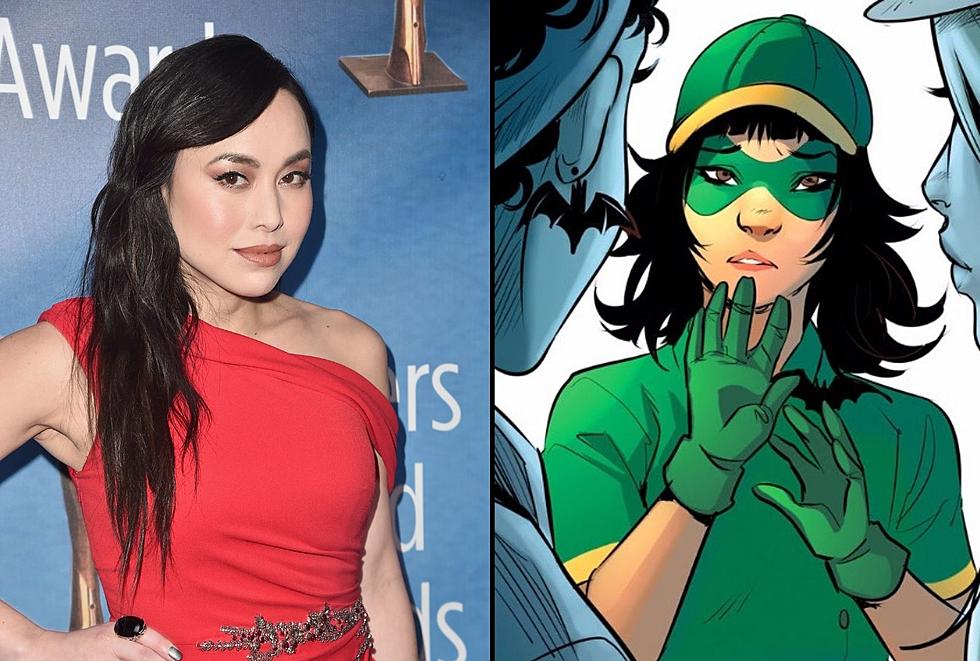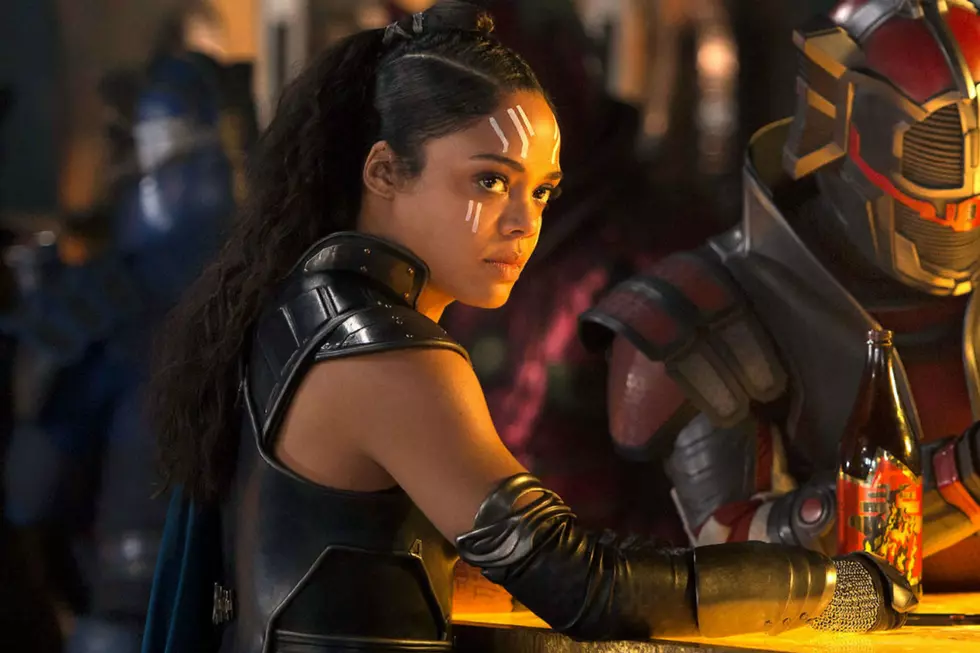
‘When We Rise’ Star Ivory Aquino: ‘Silence of the Lambs’ Wouldn’t Be Made Today
This interview is one part of ScreenCrush’s new franchise Our Hollywood, a month-long series about the past, present and future of transgender visibility in film and television. Stay tuned throughout June’s LGBTQ Pride Month for in-depth profiles with photos shot by Amos Mac, essays and exclusive videos.
Ivory Aquino has been acting for years, with a long resume of credits including classic characters like Juliet, Marc Antony and Desdemona in Off-Off-Broadway productions. But it wasn’t until this February that Aquino publicly came out as transgender and got cast in her first role as a trans character.
The Filipina actor chose to not publicly disclose her gender identity when she first arrived in New York City years ago. When Dustin Lance Black’s ABC miniseries When We Rise was seeking a trans actor to portray Cecilia Chung, a trans woman and activist for LGBTQ rights and HIV/AIDS awareness, Aquino decided to share her journey. “If there’s one kid out there who would by chance hear my story and feel inspired to be themselves,” Aquino said, “then that’s worth it for me coming out publicly.”
Over the phone, Aquino spoke about growing up watching mostly negative depictions of trans women on screen, how she’s been auditioning for both cisgender1 and trans roles since When We Rise, and how Hollywood (and society in general) has a limited understanding of what trans people look like. According to her, the next big step toward a more diverse industry begins with casting trans actors at every stage of their journey.
What’s the first trans image you remember seeing in film or TV?
What’s coming to mind is Hilary Swank in Boys Don’t Cry, but there was also a story with a soldier about Calpernia Addams [Soldier’s Girl]. And of course To Wong Foo, and unfortunately The Silence of the Lambs. But a story that really touched me and stayed with me was Torch Song Trilogy. Harvey Fierstein was of course a drag queen, but in hindsight now we can speculate where in the spectrum that character was. They may have been identifying as trans as well. But that sticks out because it was a love story and really love transcends whatever gender or sexuality orientation someone identities with.
Was there a negative depiction of a trans character that you wish you hadn’t seen growing up?
[Probably] Silence of the Lambs. What’s interesting is I was very little [when I saw it], and I personally couldn’t identify with Buffalo Bill because that’s not how I felt as a little trans girl. I never really made that connection until this conversation, but unfortunately that was a negative depiction of a trans woman. But I am someone who tends to look forward, and I think what’s exciting is where we are now. We have these opportunities, and we have the chance to really show the world what the community is really like. Silence of the Lambs, which is considered a masterpiece in cinema, I don’t think that would be able to be made now. The community has more of a voice, and I don’t think we would stand for that.
You hadn’t come out as trans publicly until you were cast in When We Rise, and before that you’d been acting in theater in cisgender and gender non-specific roles.
When I moved to New York, the visibility of the trans community wasn’t like it is now. When I completed my gender confirmation surgery – which I want to stress is not the mark of any trans person. It’s a personal choice. Anyone who is brave enough to share that they are trans, that in and of itself, is worthy of acknowledgement, regardless of any hormone therapy or surgery. […] As I was transitioning, there were no roles for transitioning trans folk. When I completed that process, I moved to New York and I just wanted to audition and act. My gender history was never– there was never was a need for [me and my friends] to talk about being cisgender or being transgender. It never was brought up.
ABC was very respectful of my privacy, but I wanted to share my story because I thought it was important that they did seek out to cast trans actors [for] trans roles. I wanted to vouch for them doing that, because not every project makes the effort, which is unfortunate because there’s so much trans talent.
What’s been the biggest difference for you as an actor from before you came out in the industry to now, where you’ve brought so much visibility to the trans community with When We Rise?
There was a huge outpouring of love from people who did not know up to that point. It’s all been positive. In terms of the industry, today is an interesting day because I had three auditions. One was for a cisgender role, two were trans roles. I’m very thankful to my agent and my manager. I feel that they have been seeing me as an artist first and foremost, and they see me being trans as– it’s an important part of me, but it’s a part of me. They also recognize that my public disclosure does not invalidate my history in the industry. I played dream roles like Juliet and Desdemona and Isabella [in Measure for Measure]. I feel very blessed to have been able to do those roles. It’s very important for casting directors, producers and directors, if they do cast me moving forward in a cisgender role, it’s significant knowing that I’m trans because they would have seen me and what I can bring to the table, in terms of talent.
I thought it was important for me to share my story in conjunction with When We Rise. [If] there’s one kid out there that heard of my story, that felt like [me] when I was little – back then, I did not have anyone in the media to look up to. If there’s one kid out who would by chance hear my story and feel inspired to be themselves and not just feel enough, but feel special, then that’s worth it for me coming out publicly.
Speaking of casting, did you see the recent clip of Matt Bomer as a trans woman in his new film Anything?
Oh my gosh. I came across that and I didn’t want to be pissed off [so I didn’t watch it]. Nothing against – It’s not just Matt. It’s the whole industry. That’s why I don’t want to [watch the clip] and have some sort of resentment for one person, when in fact it’s a confluence of entities that propagate this.
After you auditioned for When We Rise, Dustin Lance Black was upset at the casting team because he didn’t realize you were trans. You still got the part, but a lot of trans actors, like Jen Richards and Angelica Ross, have had the experience of being told they don’t “look trans enough” when going out for trans roles.
I think it highlights the fact that the trans community is as diverse as any community. Wherever one is in their transition, and however they look as a trans person, is beautiful, period. There’s no end goal because each person has their own path. [But] I do recognize this and it points to the fact that people have a certain idea of what a trans person looks like. [We can] move it forward by casting trans actors like Angelica or Jen or Laverne Cox. Literally, if you sit us in a lineup, we all are unique in our own ways. Once the world sees that there is not just one image of a trans woman or a trans man – the way that we get there is casting trans actors wherever they are on their journey. The seed of the problem is that there is a limited vision of what we look like, but hopefully that will change.
What does the future of trans visibility in Hollywood look like to you?
In that world there would be as many trans roles as there are cisgender roles, or more. In an ideal Hollywood, it wouldn’t be uncommon for a trans character to be on screen. The easiest way to envision it is, what someone sees on television and in film, does it reflect what they see in their everyday life? I am speaking especially as someone who lives in New York because I look around here, there’s so much diversity. Once what is on screen looks like what I see every day in New York City, then that would be my ideal Hollywood.
1Cis or cisgender: A person whose gender identity matches the biological sex they were assigned at birth.
More From ScreenCrush









